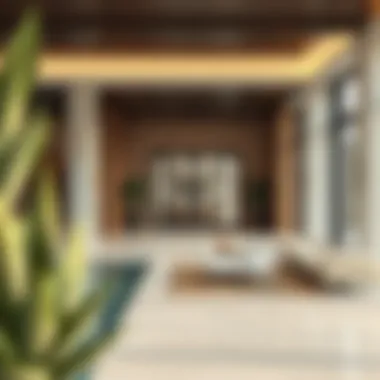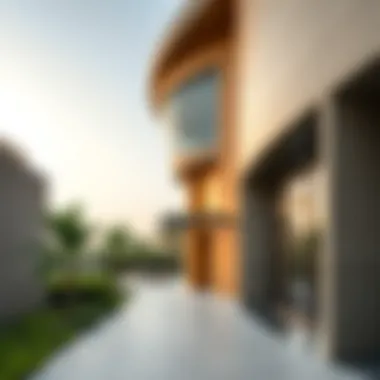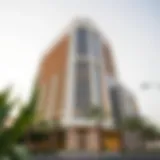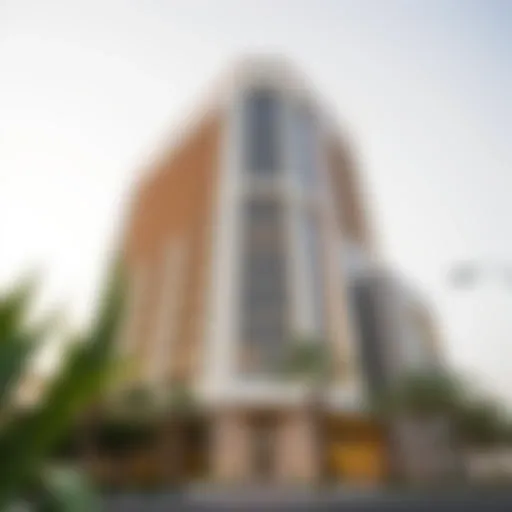Navigating Residency Complexities in the UAE


Intro
The United Arab Emirates (UAE) has become a beacon for expatriates, investors, and property seekers alike. Its booming economy, coupled with a rich cultural backdrop, offers a unique opportunity for those looking to establish roots in this part of the world. However, navigating the nuances of residency can be as intricate as the UAE’s artful architecture.
This article seeks to cut through the noise, shedding light on various residency categories and the implications they hold for different demographics such as expatriates, investors, and homeowners. As we peel back the layers, readers will be equipped with valuable insights that address not only the legal prerequisites but also the lifestyle aspects that make the UAE an appealing place for new beginnings.
Understanding residency here isn’t merely about ticking boxes. It is about engaging with a culture that boasts a unique blend of tradition and modernity, while also being primed for investment and growth. One must consider the implications on personal lifestyle and financial resources, ensuring well-informed decisions that will resonate for years to come.
In this regard, let’s delve into Market Insights—examining current trends in property, along with pricing analysis, to set the stage for potential residents and investors.
Overview of UAE Residency
Historical Context
To truly appreciate the present residency landscape, it’s essential to grasp the historical shifts that have shaped the UAE. From its formation in 1971, the UAE has transformed from a collection of small emirates into a bustling hub of commerce and culture. Initially, residency patterns were predominantly characterized by a transient workforce catering to booming industries such as oil and construction.
In the late 20th century, government initiatives began to promote long-term residency schemes aimed at stabilizing the workforce. These changes laid the foundation for what would evolve into a complex system accommodating various expatriate needs. Shifts in legislation and evolving economic strategies reflect the UAE’s commitment to fostering a diverse, sustainable society.
Current Demographics
Today's demographics in the UAE showcase a rich tapestry of cultures and nationalities. An astonishing 89% of the population comprises expatriates, making global representation a reality in everyday life. The demographics reveal deeper tales of migration patterns influenced by economic opportunities and social mobility.
- Population diversity: The UAE sees citizens from over 200 nationalities, contributing to a multicultural environment rich in festivals, cuisines, and traditions.
- Age distribution: The population is predominantly young, with a significant percentage of residents aged between 25 and 44 years, predominantly driven by employment opportunities in sectors like finance, technology, and real estate.
- Gender ratio: Interestingly, there is a notable gender imbalance due to the job market's demand for male labor, particularly in industries that involve lower-skilled labor.
This diverse population results in a vibrant social fabric but also poses challenges regarding integration and community building. Keeping abreast of demographic trends is vital for potential residents, as it affects everything from job prospects to social dynamics.
"The UAE represents a melting pot of cultures, where every corner reveals a story waiting to be discovered."
In summary, understanding the historical context and current demographics is fundamental when considering residency in the UAE. These factors not only provide insights into the UAE's journey but also inform prospective residents about the social, economic, and cultural realities they may encounter. For further details on UAE demographic statistics, check resources like Wikipedia or Britannica.
Types of Residency Visas
Understanding the various types of residency visas available in the UAE is fundamental for anyone considering a move to this dynamic country. The UAE is not just a transit point; for many expatriates, it represents a chance to settle down, pursue opportunities, and build a life. Different visa types come with their own sets of benefits and considerations, reflecting the diverse landscape of its economy and the intent of prospective residents.
Employment Visa
The employment visa is one of the most sought-after residency options for expatriates. This visa is tied to a job offer from a UAE-based employer and provides the legal framework to live and work. An employer typically sponsors this visa, which ensures compliance with Emirati labor laws.
Benefits of the Employment Visa:
- Job Security: Offers a pathway to stable employment
- Family Sponsorship: Enables the visa holder to sponsor family members once certain criteria are met
- Long-term Residency: Can lead to long-term residency options after several years of employment
However, before diving into the job market, prospective employees should be aware of potential pitfalls. For instance, should employment end, the visa status becomes precarious, necessitating quick action to secure either a new job or a change to a different type of visa.
Investor Visa
For those looking to put their money to work, the investor visa beckons. This type of residency caters to individuals who are either starting a business or making substantial investments in existing UAE enterprises. Typically, the investment threshold can vary, but options can range from setting up a business to investing in real estate.
Considerations for the Investor Visa:
- Minimum Investment Capital: Usually, a specific amount is mandated, giving a clear target for potential investors
- Business Flexibility: Investors may have the chance to explore various business sectors
- Residency Journey: This visa often leads to citizenship pathways under certain conditions
For many, the investor visa opens doors to not just residency but significant economic participation within the UAE's ambitious marketplace.
Family Visa
The family visa is valuable for expatriates wishing to bring their families along. This can be a lifeline for those who regard family unity as paramount to their personal and professional happiness. To qualify for a family visa, the principal resident must have a valid residency visa and meet a minimum salary threshold.


Features of the Family Visa:
- Inclusion of Dependents: Includes spouses, children, and in some cases, extended family members
- Educational Access: Grants children the right to educational enrollment in international schools
- Health Benefits: Enables access to healthcare services within the UAE
While securing a family visa can be relatively straightforward for eligible sponsors, applicants should be informed about the various documentation requirements and processes that can make the application journey a bit cumbersome.
Retirement Visa
With an increasing number of retirees drawn to the UAE's sun-soaked lifestyle, the retirement visa has emerged as a noteworthy option. Targeted at individuals over 55, this visa requires proof of financial stability through savings, pensions, or property ownership.
Advantages of the Retirement Visa:
- Long-Term Residency: Valid for five years, renewable
- No Work Restrictions: Allows for leisure and exploration without the pressure of employment
- Ideal Living Conditions: Offers excellent quality of life, subsidized medical services, and vibrant community activities
For retirees, the UAE proves a haven where they can savor their golden years, engaging in a cosmopolitan lifestyle while enjoying luxurious amenities and services.
In summary, understanding the nuances of these residency visas is key to establishing a successful life in the UAE. Each visa type caters to different needs and circumstances, making it crucial to explore which one aligns best with personal goals.
By weighing the options and considering personal objectives, future residents can navigate the residency landscape with clarity and confidence.
Legal Framework for Residents
The legal framework for residents in the UAE is a cornerstone of the nation’s appeal to expatriates and investors alike. This framework outlines the rights and obligations tied to residency, which are of utmost importance for anyone considering a long-term stay in the UAE. Understanding these regulations is crucial, as they influence everything from employment rights to property ownership.
Understanding Residency Laws
Navigating residency laws in the UAE can feel like walking through a labyrinth, given the country's unique blend of local customs and global influences. The foundation of the residency laws lies in the Federal Law No. 6 of 1973, which governs the entry and residency of foreign nationals. It is vital for potential residents to realize that these laws are subject to change, aligning with the government's broader vision for the country’s economy and social fabric.
Some key aspects include:
- Visa Types: Each visa type carries distinct criteria that applicants must satisfy. Employment, investor, family, and retirement visas serve different purposes and come with their own sets of regulations.
- Sponsorship Requirements: Many residency visas require a local sponsor, typically a UAE national or a company. It's critical to comprehend how this sponsorship works to ensure compliance.
- Duration and Renewal: Most residency permits are valid for a specific duration and need to be renewed periodically. Understanding when and how to undertake these renewals can save residents from unnecessary complications.
Overall, grasping the residency laws in the UAE is not just about ticking boxes; it's about fostering a sense of belonging and ensuring a smooth adaptation to life in this dynamic society.
Rights and Responsibilities
Understanding one’s rights and responsibilities as a resident in the UAE goes hand-in-hand with grasping the legal framework. With privileges often come expectations, and navigating this balance is key.
"In the UAE, knowing your rights is as essential as securing your visa; it empowers you amidst a complex tapestry of laws."
For residents, the rights typically include:
- Legal Protection: Residents are entitled to legal protections that safeguard their stake in the country, whether it involves employment, housing, or interactions with governmental entities.
- Access to Services: Many residents may access government-funded services, including healthcare and education, though eligibility can vary based on their visa type and employment status.
- Freedom of Movement: Most residency permits allow for free movement within the country and across GCC borders, further enhancing social interaction and business prospects.
On the flip side, responsibilities can include:
- Adherence to Laws: Respecting local laws and customs is paramount. Missteps can lead to fines, deportation, or worse.
- Insurance Requirements: Certain visas necessitate proof of health insurance as part of the residency process. Understanding these requirements in advance can help avoid last-minute hurdles.
- Community Participation: Engaging with local communities fosters better integration and can be a significant asset for both personal and professional growth.
Learn more about UAE Residency laws here
Explore additional resources on UAE residency
Join discussions related to UAE residency
Check official government resources
Economic Impact of Residency
The economic ramifications of residency in the UAE extend beyond mere numbers—these influences shape the very fabric of society and the marketplace. As the UAE becomes a magnet for expatriates and investors alike, understanding how residency affects economic growth is crucial. The influx of diverse populations facilitates not only the exchange of culture but also the exchange of ideas and resources, significantly impacting both individual and communal prosperity.
Investment Opportunities
When it comes to investment in the UAE, the opportunities are as vast as the desert. Residents, particularly those on investor visas, gain access to a growing market ripe for financial ventures. The real estate sector, in particular, has seen phenomenal growth in recent years, attracting both local and international investors. With tax benefits and fewer restrictions on property ownership, long-term investments in real estate can yield substantial returns.


For instance, areas like Dubai Marina and Downtown Dubai have become hot spots for high-end property investments, drawing in not just affluent expatriates, but also institutional investors.
Notably, the government frequently tweaks regulations to foster foreign investments; often announcing new developments, such as free zones that offer 100% foreign ownership. This makes entering the UAE market less daunting for potential residents looking to put down roots. Moreover, sectors such as technology, healthcare, and renewable energy are also on the rise, providing an array of options for those looking to diversify their investment portfolios.
- Key Sectors for Investment:
- Real Estate: Luxury apartments and commercial properties.
- Technology: Start-ups and tech hubs.
- Healthcare: Private hospitals and wellness centers.
- Renewable Energy: Solar projects and sustainable developments.
The trend of establishing residency not just complements personal aspirations but also fuels the larger economic engine, drawing fresh talent and expertise into the UAE.
Contribution to Local Economy
Residents significantly contribute to bolstering the local economy, creating a ripple effect that invigorates various sectors. They participate in the labor market, where diverse skills add value to industries ranging from hospitality to finance. The UAE's job market has been increasingly welcoming, providing employment opportunities that keep the economic wheel turning.
Moreover, residents spend on goods and services, touching various facets of daily life. This consumer spending helps small businesses thrive, from local eateries in the bustling streets of Sharjah to high-end boutiques in Abu Dhabi.
The tax-free advantage for many residents means that disposable income is often higher than in other nations, further promoting spending within the local economy, which serves to uplift entrepreneurial ventures.
Investing in residency is not just about personal gain; it contributes to the fabric of the UAE's economy, fostering an environment where businesses can flourish and thrive.
Consequently, as residents work and spend, they create jobs, enhance productivity, and contribute to national output, making their presence invaluable. Given the UAE's strategic position as a hub for trade in the Middle East, residents are instrumental in sustaining its economic growth and enhancing its standing on the global stage.
Understanding the economic impact of residency requires a lens that encompasses both the macro and micro levels of the economy. As residency dynamics evolve, they influence a myriad of factors that collectively drive the UAE's progress into the future.
Lifestyle Considerations
When delving into the nuances of residency in the UAE, lifestyle considerations emerge as vital aspects that can significantly influence decision-making for expatriates and investors alike. The land of sun-kissed deserts and opulent skyscrapers offers a blend of modernity and tradition, making it a tantalizing destination for many.
Cultural Adaptation
One of the first hurdles for new residents in the UAE is adapting to the richly woven cultural tapestry of the nation. This adaptation is more than just memorizing local etiquette or trying exotic foods. It's about immersing oneself in the tapestry of life that includes social norms, traditions, and even the local dialect, which can be quite distinct.
Understanding local customs is paramount. For instance, the UAE embraces Islamic traditions that affect various aspects of daily life—from the Ramadan fasting period to the significance of prayer times and modest dress codes in public.
A practical way to ease into this new lifestyle is by engaging in community activities or local clubs that promote cultural exchange. These arenas often offer invaluable insights into the societal fabric and help forge connections that may blossom into friendships and professional relationships.
Moreover, participating in local festivals like Eid or National Day can instill a deeper appreciation of the local culture and traditions. As they say, "When in Rome, do as the Romans do," or in this case, when in the UAE, immerse yourself fully in its vibrant lifestyle.
Cost of Living
Now, let's talk about the elephant in the room—the cost of living. One cannot simply gloss over this topic, as it plays a pivotal role in determining one's quality of life in the UAE. Housing costs, grocery expenses, and education fees tend to vary based on location and lifestyle choices.
Living in Dubai or Abu Dhabi can be significantly pricier than residing in smaller cities like Ajman or Fujairah. To provide better context:
- Housing: Rent or purchase prices in luxury areas like Dubai Marina can run into the millions, whereas emerging areas might offer more wallet-friendly options.
- Groceries: While some local markets provide affordable produce, imported goods often come with a premium price tag.
- Education: For expatriates, international schools may be essential, but tuition fees can reach astronomical figures.
When budgeting for your move, it might be helpful to create a detailed expense sheet prioritizing what is essential versus what is nice to have. Understanding the balance of costs can lead to more informed decisions that ensure you’re not just settling in, but truly thriving.
In summary, cultural adaptation and cost of living are two sides of the same coin when it comes to establishing residency in the UAE. Residents need to strike a balance between adapting to local ways and managing their finances wisely to enjoy all the benefits this fascinating country has to offer.
Real Estate and Residency
Navigating the landscape of residency in the UAE goes hand in hand with the real estate market. Understanding this connection is crucial for prospective residents, investors, and anyone thinking about putting down roots in this rapidly evolving country. Real estate not only shapes living conditions but also influences the very fabric of society, as it reflects cultural values and ambitions.
In the UAE, owning property can significantly impact one’s residency status. The country has introduced various incentives to encourage foreign investment in real estate, which can be appealing for those looking to reside long-term. This connection between real estate and residency is pivotal as it offers a tangible asset that can lead to visa eligibility.
Property Ownership for Residents


In the UAE, property ownership is a shaded area that's woven tightly with residency rights. Foreigners can own property in designated areas known as freehold zones across key locations like Dubai and Abu Dhabi. Owning property facilitates various residency options, often allowing investors to secure a residence visa, provided they meet the investment threshold. While the thresholds can vary, a common figure is around AED 2 million, a significant sum reflecting a serious commitment to the region.
Investors must understand that owning property is not only about having a place to live; it also entails maintaining the property, adhering to local laws and regulations, and potentially dealing with market fluctuations. Here’s a closer look at the benefits and considerations of property ownership:
- Permanent Residence: Meeting investment criteria can lead to long-term residency options, ensuring stability for property owners and their families.
- Investment Returns: The UAE real estate market has shown resilience, and smart investments may yield attractive returns over time.
- Cultural Integration: Owning a home can deepen ties to the community and promote a more enriched lifestyle within local culture.
However, it's not all smooth sailing. Prospective owners need to consider the costs associated with property maintenance, community fees, and potential legal implications due to local regulations. Make sure to engage fully with reputable real estate agents who can navigate this multifaceted landscape and help avoid pitfalls.
Rental Trends
The rental market in the UAE experiences dynamic shifts that can be both rewarding and challenging. This aspect is crucial for residents or expats who may not be ready or willing to invest in property outright. Many are drawn to the short-term rental appeal or prefer to explore before making a long-term financial commitment.
Rental prices fluctuate significantly, influenced by a variety of factors including location, demand, and economic conditions. For instance, areas like Downtown Dubai with breathtaking views and proximity to key attractions often command higher rents. Conversely, neighborhoods further from the city center may offer more affordable options, catering to those on tighter budgets.
Here are some evolving trends in the rental market worth noting:
- Co-living Spaces: As the number of expatriates rises, many young professionals are turning to co-living arrangements, creating a vibrant community within shared spaces.
- Smart Homes: Properties equipped with the latest technology are increasingly in demand as lifestyle enhancements become more desirable.
- Flexible Leasing Terms: Landlords are adapting to changing tenant needs by offering more flexible leasing agreements, accommodating both short and long-term stays.
Finally, the rental market is not just about shelter; it’s a reflection of the broader economic health and social landscape in the UAE. Staying on top of the latest trends can profoundly impact residency decisions, whether you’re bringing your family or commuting for work. With each wave of new developments, the market continues to shape how residency is perceived and experienced in the UAE.
Challenges of Establishing Residency
Establishing residency in the United Arab Emirates can often be a complex ordeal. While many seek the perks of living in a bustling economic hub, an array of challenges can present themselves. It's not just about filling out forms or obtaining a stamp on your passport; it involves navigating a labyrinth of regulations, cultural nuances, and societal dynamics. Understanding these challenges is vital not only for potential residents but also for investors, homeowners, and stakeholders involved in the UAE property market.
Regulatory Hurdles
One of the most daunting challenges faced by expatriates is the array of regulations governing residency. The legal framework surrounding residency in the UAE can feel like deciphering a mystery at times. For instance, variations exist between the different emirates, each having its own set of rules, which can pave the way for confusion.
- Visa Types and Legal Compliance:
Different categories of residency visas exist, each with its own requirements. The documentation needed for an employment visa differs significantly from that for a family visa. An investor seeking a residency visa must also present comprehensive financial records. Missing a single document can lead to rejections or delays, which is frustrating and precarious for eager applicants. - Changing Regulations:
The regulatory landscape is not static. Laws are frequently revised, and this unpredictability can catch many off guard. For example, recent shifts in 2023 regarding investor visa requirements posed a challenge to many potential foreign investors. Keeping abreast of these changes necessitates constant attention to government updates and particular industry news. - Bureaucratic Processes:
The bureaucratic process can feel like running a marathon without an end. Long queues, nontransparent procedures, and varying levels of customer service can quickly become hurdles requiring patience and resilience.
"Navigating the legal maze of residency in the UAE is often more challenging than anticipated, especially with the regulatory system constantly evolving."
Integration into Society
Once residency is established, the next significant hurdle is the integration into UAE society itself. Simply obtaining a residency visa does not guarantee a seamless transition into a new community. For investors, agents, and property owners, building relationships and understanding cultural nuances is pivotal.
- Understanding Cultural Norms:
The UAE is a melting pot of nationalities, but it is also deeply rooted in Arab culture. Customs, traditions, and social etiquette can vastly differ from Western countries. Engaging with local culture is crucial. For example, understanding dining etiquette, public behavior norms, or religious sensitivities can go a long way in building rapport. - Community Engagement:
Involving oneself in local communities—be it through cultural programs or business networking—can vastly improve stability and success in life. A lack of integration may lead to feelings of isolation, which impacts both personal well-being and business opportunities. - Language Barriers:
While English is widely spoken and understood, many traditions and social opportunities stem from Arabic. Learning even basic phrases can show respect and open doors that might otherwise stay closed.
In summary, while UAE residency offers numerous benefits like tax advantages and a high standard of living, the challenges surrounding regulatory hurdles and societal integration are significant. Therefore, potential residents must prepare meticulously to navigate this multifaceted landscape effectively.
Future Trends in Residency
As we step into an era of rapid globalization and digital transformation, the landscape of residency in the United Arab Emirates (UAE) is undergoing significant changes. Understanding these trends is crucial, not only for aspiring residents but also for investors, developers, and agents. The evolving dynamics offer opportunities as well as challenges, influencing the decision-making of those looking to call the UAE home.
Changes in Immigration Policies
Recent shifts in immigration policies in the UAE have opened new doors for expatriates and foreign investors. In a bid to attract and retain talent, the government has introduced various long-term residency options, such as the Golden Visa and the Green Visa. This move aims to establish the UAE as a global hub for skilled professionals and entrepreneurs, creating a more diverse community.
One notable aspect of these changes is the flexibility they provide. For instance, the Golden Visa allows eligible candidates to reside in the UAE for up to ten years without the need for a national sponsor. This advancement eliminates much of the uncertainty previously felt by expatriates regarding their residency status.
Moreover, there’s a focus on enhancing the ease of access to visa processing. With initiatives like the introduction of online applications and faster processing times, potential residents can navigate the regulatory maze more smoothly.
"The UAE's adaptability is key to its success in attracting global talent."
In addition to the long-term visas, regulations are increasingly accommodating for business setups, allowing investors to own 100% of their venture without needing a local partner. This incentive significantly boosts the entrepreneurial landscape, leading to an influx of international companies wanting to establish a base in the UAE.
Evolving Lifestyle Preferences
In tandem with changes in immigration policies, the lifestyle preferences of potential residents are also evolving. The modern expatriate is not merely seeking a place to live; they are looking for a lifestyle that aligns with their values and aspirations. The UAE’s cultural diversity, a reflection of its rich history and global exposure, plays a significant role in making it an attractive destination.
With a growing emphasis on quality of life, prospective residents are considering factors such as recreational amenities, educational opportunities, and healthcare accessibility when making their residence decisions.
Furthermore, the shift toward remote work is changing the game altogether. Many individuals are now looking to the UAE for its strategic location, quality infrastructure, and rising digital nomad community.
Recent studies show that people are prioritizing well-being and work-life balance more than ever. For example, the local government has invested significantly in green spaces and wellness initiatives that cater to this new generation of residents seeking a healthier lifestyle.











